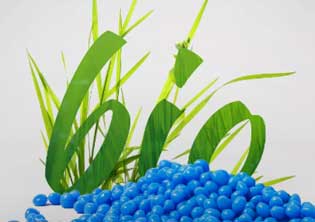New TPEs from renewable raw material sources with a lower product carbon footprint

Sustainability is a key aspect of the design phase. It is only when the idea of sustainability plays a major role from the very start of a project that it can contribute to the project's long-term success. Kraiburg TPE's customers already have access to more sustainable compounds containing proportions of post-industrial or post-consumer recycled materials, particularly in the consumer and automotive sectors. Kraiburg TPE is now complementing its range of more sustainable solutions by adding bio-based TPEs made from raw materials that support the transition from compounds based on fossil resources to alternative products based on renewable materials, making this transition attractive.
When evaluating new raw materials for biobased TPEs, Kraiburg TPE focuses on materials that are not used for food production. These are raw materials such as agricultural by-products or waste materials from food production that cannot be used as food even after further processing. Kraiburg TPE critically evaluates the origin of raw materials to meet the company's high self-imposed requirements. By working closely with suppliers, Kraiburg TPE ensures a delivery capability for bio-based and recycled raw materials comparable to that for conventional base polymers.
Using bio-based TPEs can reduce a product's carbon footprint (PCF) by up to 50% compared to TPEs made from fossil-based materials. PCF refers to the total amount of greenhouse gas emissions, particularly CO2, associated with the production, usage, and disposal of a specific product or service. Transparency and understanding the PCF enable end customers and processing companies to make informed decisions when selecting materials to produce and market more sustainable products. This aspect is currently of interest in all markets where there is a demand for materials with reduced carbon footprints. By using renewable raw materials in the production of biobased TPEs, Kraiburg TPE actively helps customers achieve their sustainability targets.
Bio-based TPEs provide neutral odor, touch, grip, and adhesion properties highly comparable to those of fossil-based TPEs. The new products include solutions such as compounds with adhesion to PP, ABS/PC, and PA within a hardness range between 30 and 85 Shore A. Individual compounds have a bio-content of more than 60%. Both compounds with adhesion to PP and to polar materials can be colored. The materials have been thoroughly tested in injection moulding and extrusion and have processing properties comparable to those of fossil-based TPEs.
"With biobased TPEs, we are filling a gap in our portfolio and taking another step toward more sustainable TPEs. Our biobased TPEs provide more sustainable solutions while maintaining the usual performance and reducing the product carbon footprint. We look forward to projects that enable us to make the transition from fossil-based to more sustainable raw materials," says Dr Tobias Brückner, Project Manager of Advanced Development at Kraiburg TPE.
Bio-based TPEs are currently produced in Germany and are available worldwide immediately. (Press Release)
(PRA)
Subscribe to Get the Latest Updates from PRA Please click here
©2023 Plastics and Rubber Asia. All rights reserved.

©2023 Plastics and Rubber Asia. All rights reserved.
Home Terms & Conditions Privacy Policy Webmail Site Map About Us















